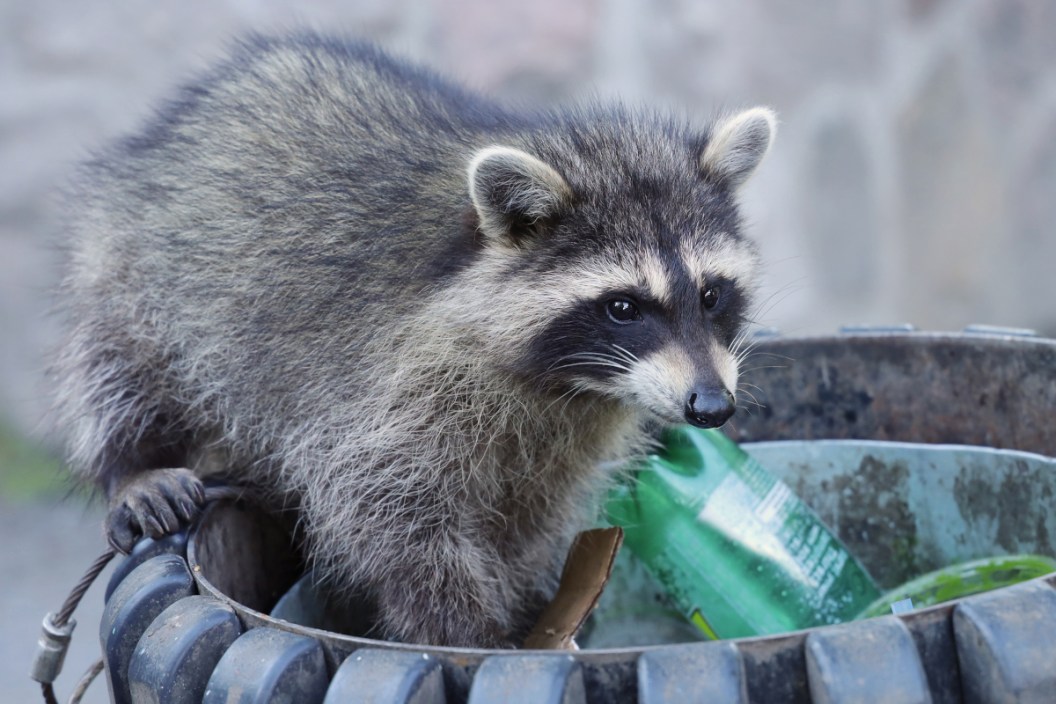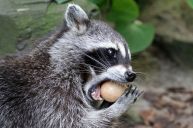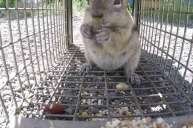Here's a good dose of raccoon knowledge to keep you one step ahead of nature's masked bandit.
We know raccoons in so many ways, but do we really know what raccoons eat? Since our childhoods when we first learned that these critters would walk the creek banks right next to us in search of crayfish, and full into our adult lives, we've seen these little masked buggers in our garbage cans, dumpsters, and at any unattended pet food dishes helping themselves as if it was their own.
These brave little bandits are one of the most urban-happy wild animals out there. They are right at home just about anywhere, even in the city. Their most favorite source of food is whatever they can find in front of them, particularly if it comes out of a trash can.
As scavengers for a wide variety of foods, raccoons and homeowners can and will do battle in a never-ending struggle to see who is smarter. And the bottom line is that there sure are a lot of raccoons around.
Discussing the range of the raccoon would be like discussing the range of air in the atmosphere, but they can basically live in every state where they can find food and shelter, and that's all of them. They're obnoxious, obstinate, overbearing, and they're here to stay.
Let's then try to answer some other burning questions about this little masked bandit.
Where Do Raccoons Live?
Raccoons can live in hollow trees and they can also live in your attic, if they can get in there. They are quite adept at making their homes in places that you wouldn't think to look like hollow logs. They also can find shelter in abandoned cars, crawl spaces, barns, and inside or underneath of your shed.
They also use ground burrows, brush piles, muskrat houses, barns and other abandoned buildings, haystacks, and rocky outcroppings. They can get inside of your chimney, under your porch, or in your woodpile, there's just no end to the places raccoons might call home.
Do Raccoons Hibernate?
Raccoons do not hibernate, but they do prepare for winter and spend long periods sleeping or at rest during the coldest stretches. As with many creatures, they spend the later parts of the fall searching and eating as much food as possible, making it even more important to keep garbage can lids secured tightly.
Along with the extra body fat they have a very coarse fur that helps to insulate them at this time. Raccoons may spend up to a month sleeping, sometimes in group dens, which is why they aren't seen very often in winter unless it warms up for a decent stretch.
Are Raccoons Dangerous?
Maybe the better word be aggressive, and yes, they can be very aggressive even towards humans, and that does make them a bit dangerous. They can be quite powerful for their size, (sometimes up to 30 pounds) and don't mind getting into it with your dog depending on the breed.
And yes, along with skunks, foxes, and bats, raccoons can be a prime carrier of the rabies virus, parasite like roundworm, and even distemper. Their feces can also carry dangerous roundworm parasites that can make humans very sick.
Raccoons have long, sensitive digits and sharp claws which only add to their sharp teeth. They can be quite intelligent and will usually run away at any sign of humans, but if they are cornered or sick they will stand their ground.
Some people will tell you that they will kill cats, small dogs, and an entire coop full of chickens just to say they did.
How To Get Rid of Raccoons
Certainly, the first order of business is to remove the things that are attracting them to your property. It's bad enough that these dumpster pandas will attempt to get in to whatever they can, but they will get aggressive with your pets and kill smaller livestock like chickens.
Simple, but productive ideas include securing garbage bin lids and bird feeders, and removing fruits leftover from trees. Don't leave any pet food outside, and absolutely do not purposely feed them.
Fencing, sealing off entry points, and removing easy to find den areas can help to keep them away as well.
There are other alternative methods that purport to scare, chase, or otherwise keep raccoons at bay on your property, but when it comes right down to it, coons are deceptively smart and it doesn't take long for them to realize that there is no real threat in your deception and they will walk right over it.
As far as trapping the little beasts, unless you are ready to destroy it, you should really let a professional do it since they have all the means to take care of a caught animal.
So, what do raccoons eat?
So, what do raccoons eat in the wild? As serious omnivores, they will eat pretty much anything that they can get their furry little paws on. Bird eggs, (including wild turkey eggs if they find them) reptile eggs and the reptiles themselves, amphibians, clams, frogs, and other small animals. They do eat veggies too, even mast like acorns.
Baby raccoons will stay with their mother for the first season, learning to climb away from perceived danger and scavenging for food in urban areas. They really have no favorite foods as everything and anything is on the menu for these critters.
For those of us that live in more rural areas, it is a simple matter of losing some sleep and keeping your favorite rifle handy, ready to be loaded at a moments notice as pest control simply means waiting for them to show up after dark, getting their eyes to glow in your spotlight, and pulling the trigger.
The only real problem that you will have is explaining to your wife why you're hooting and hollering at three o'clock in the morning.
Products featured on Wide Open Spaces are independently selected by our editors. However, when you buy something through our links, we may earn a commission.
Looking for a new way to display those antler sheds? Go to Rack Hub and use the coupon code Craiger. Be sure to follow my webpage, or on Facebook and YouTube.
NEXT: YOUNG BUCK FIGHTS RACCOONS OFF THE CORN PILE
WATCH





